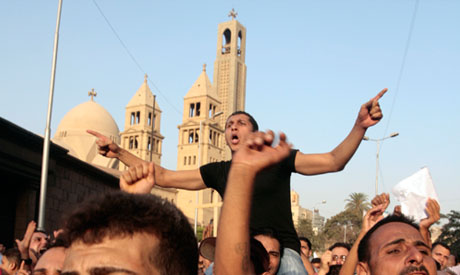Coptic church in Egyptian village threatened after girl disappears
Ekram Ibrahim
15/2/2012
Muslim Brotherhood activists form human chain around a Sharqiya church in the central Delta valley after Coptic girl’s rumoured conversion to Islam and subsequent disappearance
A church in the Nile Delta’s Sharqiya Governorate was subject to intermittent attacks this week after a Coptic-Christian girl allegedly converted to Islam before mysteriously disappearing.
Rania Khalil, a 16-year-old Coptic Christian, is the daughter of a Coptic mother and a Muslim-convert father. Khalil has lived with her mother all her life except for the last six months, during which she moved to the home of her father, who converted to Islam some four years ago and married a Muslim woman.
According to residents of Mit Bashar village in the Sharqiya Governorate in which her father lives, Rania converted to Islam earlier this month and celebrated her engagement to a Muslim man.
On Sunday, however, she abruptly vanished.
So far, two explanations have been posited for the girl’s disappearance. Some say she was kidnapped by her family and is being held against her will in the village’s Virgin Mary Church; others suggest that she ran away from her father to live with her Christian mother.
“In either case, the church has nothing to do with the issue,” Ishaq Ibrahim, a researcher at the Cairo-based Egyptian Initiative for Personal Rights, said.
“We cannot consider a family member taking the child a kind of kidnapping,” Nabil Gabriel, a lawyer close to the Coptic Church, told Ahram Online. “Egyptian law prohibits minors under the age of 18 from changing his or her religion.”
The suggestion that Rania was being held in the Virgin Mary Church prompted several local residents to converge on the church on Monday evening. The following day, some 2000 people surrounded the building, throwing stones and Molotov cocktails and chanting sectarian chants.
For the next three days, the unrest continued, with cars in the area being set on fire and a fence surrounding the church being broken.
The missing girl, however, was not found inside the church building.
On Wednesday, Sharqiya Governor Azazi Ali Azazi declared that the girl had not in fact been kidnapped, but was being held at the local security directorate. “The escalation of this incident is an attempt to sow sectarian violence in Egypt with the aim of destabilising the country,” Azazi said.
The situation eased considerably after members of the Muslim Brotherhood’s Freedom and Justice Party(FJP), along with the imam of a local mosque, urged village residents to exercise restraint. They also formed a human chain around the church to protect it from attacks by locals.
“What you’re doing violates the rules of Islam,” the imam told village residents on Wednesday. “The Church is God’s home.”
Nevertheless, several Coptic-Christians have taken refuge inside the church out of fear for their safety.
“I’m waiting inside the church with several others until we are guaranteed a safe exit,” Emile, a member of the Maspero Coptic Youth Union, who declined to give his family name, told Ahram Online.
It is not the first time that rumours of a female Coptic convert to Islam have sparked controversy.
Eight Coptic families in Alexandria’s Amerya district were asked to leave their homes earlier this month after an informal hearing held by a local sheikh.
The crisis erupted in late January when obscene footage of a Muslim woman was sent from the cell phone of a young Christian man. Brawls quickly ensued between local Muslim and Coptic youths, which escalated after several Coptic homes were set on fire.
And in March of last year, a church in the governorate of Helwan was set ablaze and eventually demolished as a result of sectarian tensions. This was followed shortly afterward by an attack on a church in Cairo’s Imbaba district and another on the Merinab Church in the Upper Egyptian city of Aswan.
Last October, a protest march by Coptic-Christian activists was violently dispersed in Cairo’s Maspero district by military forces, leaving scores of the former dead.
In most cases, the government either resorted to informal hearings to resolve the crises or failed to hold those responsible for the violence accountable.

